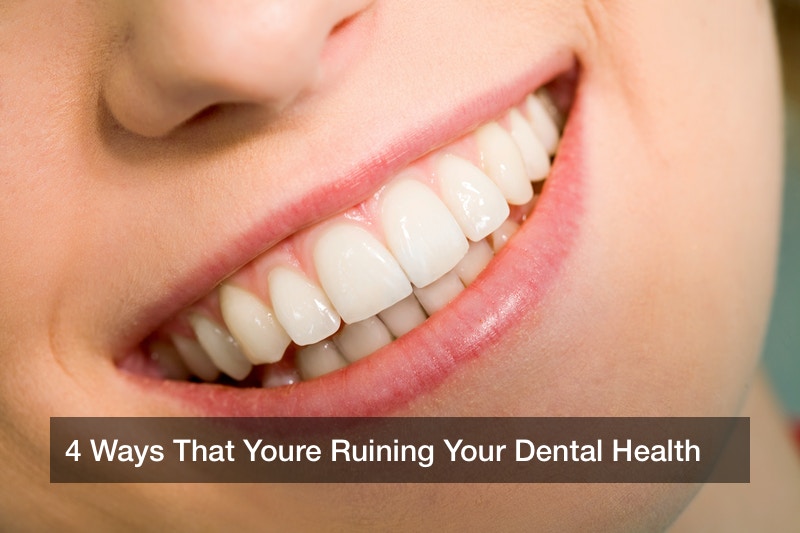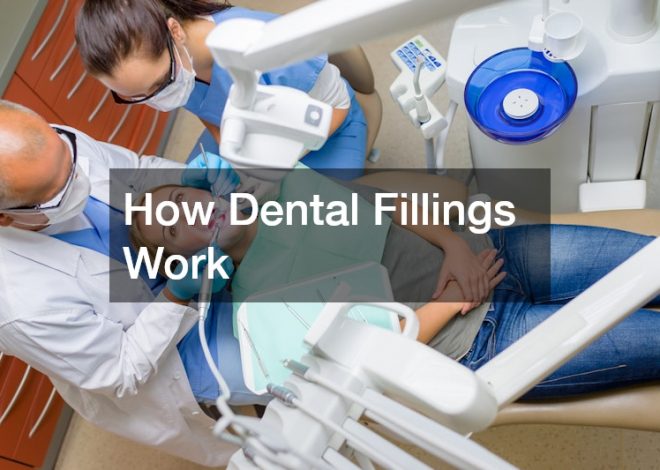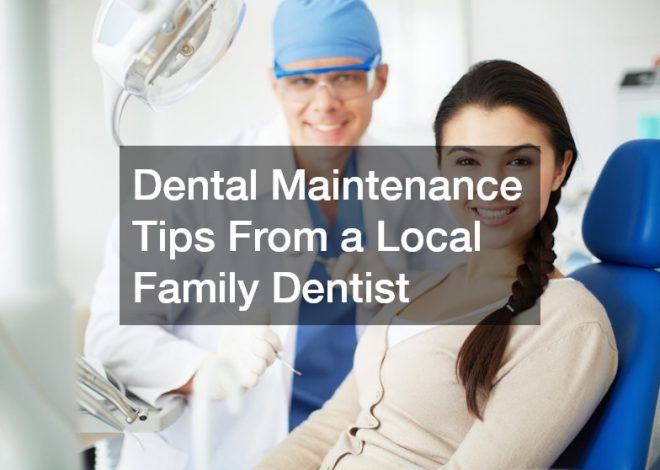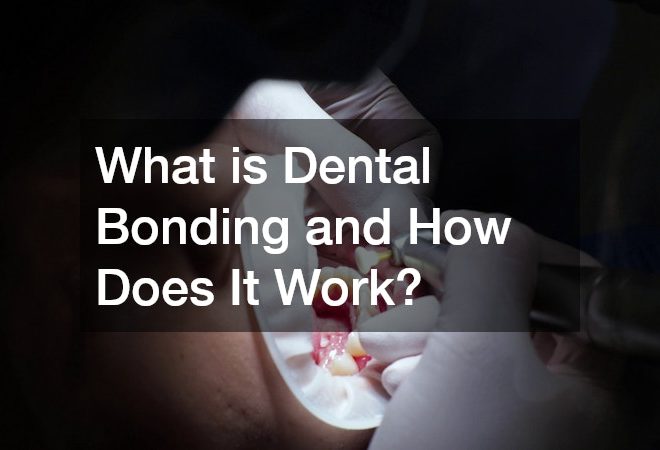
4 Ways That Youre Ruining Your Dental Health

Our dental health is much more important than we realize, but the fact is that many of us don’t take care of our teeth the way that we should. While many issues with the rest of our body can be repaired, teeth are remarkably delicate and difficult to truly replace. While we all have a set of baby teeth that we lose over time, our adult teeth is our last set of teeth. That set of teeth is meant to last for the rest of your life, but a lot of adults don’t treat their teeth with the proper degree of respect that they’re owed.
While damaged teeth can be replaced with artificial implants or, in particularly severe cases, dentures, this is far from ideal. Not only can artificial teeth fall out, leading to embarrassing incidents; they sometimes have to be replaced over time, which can be problematic, annoying, and expensive. Therefore, the best thing for your health and your sanity is to take care of your teeth from the start and listen to advice from your dentists. However, a lot of us have ingrained bad habits that severely impacting our dental health without our knowledge.
Many of the major problems that plague people regarding their dental health are linked to small mistakes rather than big ones. At the end of the day, our teeth are not that difficult to care for; but a lot of issues stem from the fact that we ignore our general dental health and take the easy way out. Remember when caring for your teeth that they are the only ones you have, and try to do your best to stay on top of the basics while at the same time honoring appointments with your dental practice. With that being said, let’s look at some of the worst mistakes you can make when caring for your teeth, and what you can do to correct them.
1. Putting Off Wisdom Teeth Removal

The removal of wisdom teeth was once considered a routine part of dental health upkeep. While this may seem surprising at first, it makes sense once you remember that wisdom teeth have no real purpose. They’re so far back in the jaw that these molars contribute little to nothing to the chewing of your food. For that matter, they are essentially vestigial for most people, meaning that while they once had a purpose, they’re now completely useless.
This means that the rest of the mouth crowds them out, to the point that oftentimes adult wisdom teeth cannot fully emerge from the gums. They often either never emerge, becoming impacted; or they partially emerge and become infected, which results in your wisdom teeth potentially causing an inflammation, or even an abscess. An abscessed wisdom tooth is extremely painful, and the infection that it causes can travel through the bloodstream, with serious side effects. This is why removing the wisdom teeth is not only considered a part of tooth care, but periodontal care.
While some dentists disagree with the prophylactic removal of the wisdom teeth, the procedure does not have negative effects and is fairly simple. Patients are typically put under local or general anesthesia, depending on their preferences and their dentists’ recommendations. Either way, they will feel nothing as the wisdom teeth are removed, and will wake up with sutures and packaged gauze that can be easily changed. Though the healing process typically lasts a few weeks, the patient should be able to participate in everyday life within a few days, albeit with some temporary dietary restrictions.
These restrictions ensure that the blood clots around the surgical sites are not dislodged, and they can be healed without issue. Ultimately, this procedure might involve some soreness during the recovery process, but with the help of pain medication is far from traumatic and not only prevents potential dental health complications, but in general, makes caring for your teeth easier. After all, caring for your wisdom teeth can be difficult; some can’t even reach them to brush them properly.
2. Neglecting Gum Care

Returning to the idea of periodontal care as it relates to your overall dental health, it’s important to remember that caring for that health isn’t just about caring for your teeth. It’s also about caring for the structures that support your teeth, and especially your gums. The toothbrush itself isn’t only meant to clean your teeth; it’s meant to clean your gums as well. Chances are that at some point or another, you have brushed your teeth and found blood in the sink after you rinsed and spit. As long as this blood isn’t excessive, you’ve probably dismissed the issue as a touch of gingivitis, or perhaps the result of you brushing too hard and causing light damage to your gums.
While gum disease may not seem like something you need to concern yourself with immediately, it can easily develop into a serious problem over time. For that matter, unless you were truly being rough as you brushed your teeth, there should be no reason why brushing them would harm your gums. After all, a toothbrush is meant for gum care as well. You should take notice of any symptoms of gum disease, including bleeding, gum pain, receding gums, sores in your mouth, and persistent bad breath. If you have at least one of these symptoms, you should certainly bring it up to your dentist; but if you have multiple symptoms, you should make an appointment to discuss them further.
Fortunately, there are gum disease treatment options available. Unfortunately, they don’t involve a miracle pill that magically removes your gum disease. Medications such as penicillin, topical antiseptics, and antibiotics can help deal with any infections, and in more serious cases infected or seriously inflamed tissue may need to be removed. With that being said, the most important thing to consider is how to avoid gum disease in the first place. This would involve not only caring for your teeth as you always should, brushing and flossing twice daily, but also using mouthwashes to further prevent infection.
3. Sticking To The Basics

With that being said, if you want to go above and beyond in terms of your dental health, you may need to consider more than just the basics. Now, regular dental care is important, and you should always consult with your dentist before beginning a new dental care regimen. However, there are holistic methods that you can do to back up your regular cleaning every six months, as well as your daily brushings, flosses, and mouthwash usage.
While it’s not a great idea to use holistic treatments as alternatives to traditional dental treatments, they can be used as supplements. For example, if you’ve decided to have your wisdom teeth removed but have adverse reactions or issues with the pain medications prescribed by dentists, which can sometimes be quite heavy, natural pain medications like CBD capsules could be an option instead.
If you’d like to boost your gum health, you may want to boost your usage of green tea. Saltwater rinses have also been advised for those seeking to strengthen their gums while also removing food particles that may cause inflammation down the road; for that matter, it’s often a lot less harsh than some mouthwashes. Oil pulling also has its advocates as an alternative to or companion to mouthwash.
Oil pulling involves essentially swishing a typical of oil around the mouth for 15 to 20 minutes. This will ideally loosen up food particles stuck within the mouth, and also remove some bacteria. The oil is then spat out, releasing those particles and bacteria. With that being said, it’s important in these cases to consider the type of oil being used. Coconut oil is among those most frequently recommended.
But again, CBD oil can be used not so much for oil pulling but natural pain relief following a dental procedure, or if you have particularly sensitive teeth. Fortunately, medical cannabis delivery services make their usage easier than ever. But if that’s not for you, some of the products that are basics in your pantry can still be used to lessen minor toothaches and pains holistically. Cayenne pepper has long been used as a topical pain relief, and for those less inclined to the spice, garlic paste can also be applied to the teeth or gums to alleviate pain. Ultimately, there are so many options, holistic and not holistic, currently available that there is no need for you to suffer from tooth pain at all.
4. Forego Braces

Braces are not going to be a part of the care and keeping of all teeth. Some people are perfectly able to maintain their dental health without braces, but this is highly contingent on the natural capabilities and health of your teeth. While we all associate braces with straightening teeth orthodontic care can be used to treat several different issues. This includes a pronounced overbite, as well as more complex problems that involve the rearrangement of the teeth. Some are born without the proper set of adult teeth, which means that they need implants to replace them.
These implants are often put in place after the teeth are carefully rearranged through braces. Yet despite the clear need for braces, a lot of people put off early orthodontic treatment due to the hassle, the expense, and the perceived embarrassment surrounding orthodontic devices like braces and retainers. This, even though braces in particular are extremely common and are used by so many that they aren’t very embarrassing to a lot of recipients in this day and age. Due to the association of braces with cosmetic care, a lot of people don’t even really classify them as being associated with real dental health concerns.
There are serious consequences for those who ignore the need for braces or other orthodontic devices. One of these, of course, is aesthetic. When braces are recommended, it’s often because those who need them will have serious aesthetic issues with their teeth when they grow up which may not be visible in adolescence. These could impact their ability to make friends or sometimes even their ability to get a job. Oftentimes, those who skipped braces as children get them as adults, when it’s not only more embarrassing but more awkward and expensive. But there are also real physical problems that come with skipping orthodontic care.
Teeth that overcrowd the mouth, as they often can without braces, cause pain as well as issues with chewing. They may struggle more with cavities and inflammation, as it could be easier for food to get caught in their teeth. Jaw pain is another common complaint among those who decided against braces at a young age. This is because of the way the teeth may align, and grind against each other. Ultimately, these consequences are quite real and must be taken seriously.
Properly caring for your teeth is about much more than going to visit your family dentists regularly. You also need to take these extra steps, and as we mentioned above, go beyond the basics. It’s important to be dedicated to your dental care, and to ask your dentist about what you can actively do to prevent damage as well as hopefully reverse any damage that has already been done.
For that matter, visit the dentist if you feel like there are issues with your teeth, just as you would visit the doctor if you felt there were issues in any other part of your body. While your teeth may seem fine now, there may be underlying issues that you aren’t even aware of.
It’s easy to have anxiety about visiting the dentist, which is a major reason why a lot of people put off going to see the dentist in the first place. But dentists are there to help, and as long as you’re open and honest with them, they can set you on the right path to restoring and revitalizing your dental health before you know it.


